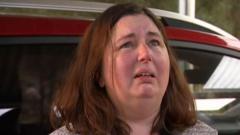Following a BBC Africa Eye documentary revealing security forces' involvement in the killings of unarmed protesters in Kenya, human rights organizations are pressing for accountability while the government defends its actions and critiques the documentary's bias.
Calls for Accountability Rise in Kenya Following BBC Exposé of Police Brutality

Calls for Accountability Rise in Kenya Following BBC Exposé of Police Brutality
Renewed demands for investigations into police and army conduct arise after revelations of security forces' lethal actions during anti-tax protests in Nairobi.
Authorities in Kenya are facing mounting pressure to investigate the police and military following a BBC Africa Eye exposé shedding light on the killing of protesters during tax rise demonstrations last June. The investigation revealed that members of the security forces shot dead three demonstrators at the parliament, igniting calls for justice and accountability from human rights organizations.
Amnesty International and the Kenya Human Rights Commission (KHRC) are demanding that those implicated in the documentary should be held responsible, as public sentiment grows over the tragic events that occurred when more than 100,000 citizens rallied against a controversial finance bill. In response, government spokesman Isaac Mwaura defended Kenya's security forces, stating that "every life is important," but criticized the documentary for its purportedly unbalanced portrayal, which he argued failed to capture the full context of the protests.
The BBC documentary, which analyzed over 5,000 images and videos, indicated that security personnel, identified as police and soldiers, had engaged in excessive use of force, allegedly aiming to kill the protesters. The wider crackdown throughout the demonstrations resulted in at least 65 fatalities, 89 disappearances, and thousands of arrests, with the government citing a lower death toll of 42.
In light of the documentary's airing, the BBC was forced to cancel a planned screening in Nairobi due to government pressure. However, the film remains accessible on BBC Africa's YouTube channel, with both the public and human rights groups urging for an open inquiry into the killings that occurred amid the protests.
Activists assert that the documentary corroborated earlier allegations of excessive force used against peaceful demonstrators, prompting them to call for official acknowledgment from security agencies regarding the situation following the exposé. Meanwhile, President William Ruto faces growing scrutiny as activists hold him accountable for the actions of the security forces.
As the Independent Policing Oversight Authority (IPOA) continues its investigations, early findings reveal that of the deaths investigated to date, 41 were due to gunshot wounds. Opposition groups have characterized the violence against protesters as a premeditated action sanctioned by high-level authorities. As tensions escalate, calls to hold responsible parties accountable persist, challenging the narrative presented by the Kenyan government.



















